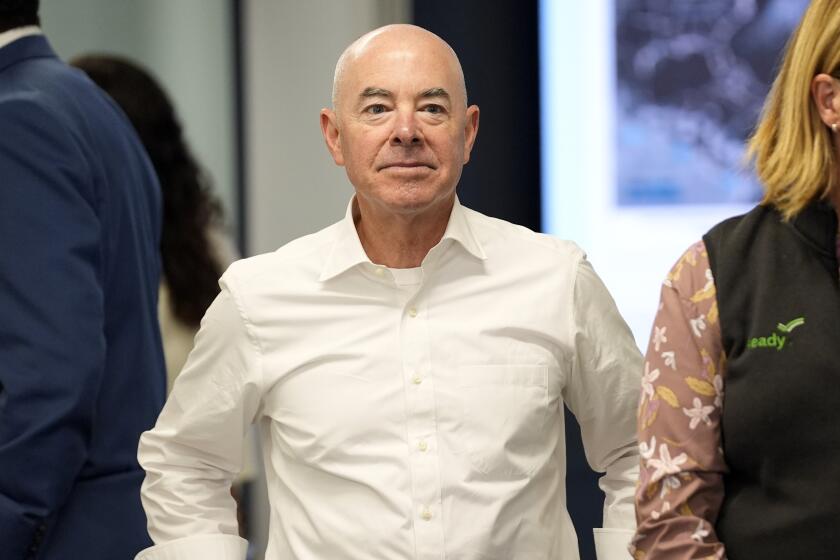New Passenger Profiling System To Be Tested
In a concession to privacy advocates, the government on Thursday announced plans for a computerized profiling system for air travelers that would be less intrusive than previously envisioned.
“We will meet the goal of improving security,” said Transportation Security Administration chief David M. Stone, promising a more thorough and accurate system. “We will be protecting privacy and civil liberties.”
Stone said that people wrongly suspected would be able to clear their names.
The government said it would call the new system “Secure Flight” instead of continuing to refer to it by the acronym CAPPS II.
The current profiling program, known as CAPPS, or Computer Assisted Passenger Pre-Screening, flagged 6 of the 19 Sept. 11 hijackers for additional searches at the airport. At the time, the only follow-up required was a closer inspection of their checked baggage, which revealed nothing.
But the system was criticized for snaring many innocent travelers as well, a weakness that led some to discount its warnings.
About 15% of the nearly 2 million domestic air travelers each day are now pulled aside for more intrusive searches. That would drop to about 5% with the new system, Stone said.
Privacy advocates said the announcement was a promising sign, but cautioned that many of the details had not been revealed. The government has spent about $100 million on the project.
“This is certainly a step in the right direction ... but this kind of thing bears close scrutiny before we can make an ultimate judgment,” said Jay Stanley, a spokesman for the American Civil Liberties Union.
“It still poses threats to our liberties, even if those threats are not as immediate as they would have been under the previous system.”
The Bush administration was under pressure from the Sept. 11 commission.
The bipartisan panel, which investigated the terrorist attacks, had urged the government not to get bogged down in a protracted debate over privacy and to instead make immediate -- if less sweeping -- improvements.
The nonpartisan Government Accountability Office also had criticized CAPPS II, saying in February that “the system may not meet expected requirements, may experience delayed deployment and may incur increased costs.”
The government announced in July that it was scrapping its plans for CAPPS II, following criticism that the program would unduly invade passengers’ privacy.
Stone said the government expected to begin testing the new profiling system in the fall and planned to phase it in next year.
Under the system, the government will take over from the airlines the responsibility of comparing passengers’ names against the thousands of names on security watch lists. Because of fears of leaks, intelligence agencies now withhold the names of some suspects from the airlines.
The information provided to the airlines when passengers make a reservation will be electronically transmitted to the government. In addition to the passenger’s name, the “Passenger Name Record” can include phone number, address, hotel and car reservations, frequent-flier program information and other details.
In cases where a passenger’s name appears to be a close match to a name on a security list, the government will use the detailed reservation information to try to determine whether the passenger should be considered a threat.
“We will have the ability to take the data and resolve those ambiguities,” said Stone.
“Right now that depends on the talent you’ve got at the ticket counter.”
Most passengers flagged by the system would be subjected to closer searches. A very small number probably would not be allowed to board and could face arrest. The agency would set up an appeals process for those wrongly suspected.
Some passengers would still be randomly selected for additional screening.
“A random element to any security system is absolutely critical,” said Stone, because it could serve as a check on the system.
Secure Flight would differ from CAPPS II in several ways.
Passengers would not be coded green, yellow or red according to their security status, as was proposed with CAPPS II, said Stone.
Under CAPPS II, the computer system would have tried to predict who might be a terrorist suspect. The new system will not try to do that.
CAPPS II would have also screened passenger lists for wanted criminal suspects. The new version will focus only on terror suspects.
The agency backed off from a plan to use commercial databases to try to verify the identity of each passenger. Critics contended that doing so could have led to discrimination against people who moved frequently or had a bad credit history.
Stone said the agency would examine the possibility of using commercial databases by testing them with passenger information from completed flights.
“TSA will not use commercial [databases] unless testing confirms it enhances security and does not violate privacy,” said Stone.
But Stanley, the ACLU spokesman, said the new system could be vulnerable to identity fraud. And he cautioned that many of its workings would be secret.
“Americans will still be judged secretly,” he said. “The key question becomes ‘What is going on within the terrorist screening center?’
“The content that [the government] uses to create the lists will become the name of the game.”
More to Read
Sign up for Essential California
The most important California stories and recommendations in your inbox every morning.
You may occasionally receive promotional content from the Los Angeles Times.










